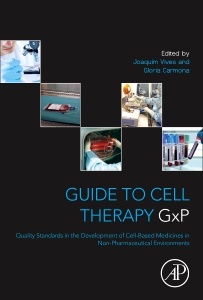Guide to Cell Therapy GxP Quality Standards in the Development of Cell-Based Medicines in Non-pharmaceutical Environments
Auteurs : Vives Joaquim, Carmona Gloria

Guide to Cell Therapy GxP is a practical guide to the implementation of quality assurance systems for the successful performance of all cell-based clinical trials. The book covers all information that needs to be included in investigational medicinal product dossier (IMPD), the launching point for any clinical investigation, and beyond. Guide to Cell Therapy GxP bridges a knowledge gap with the inclusion of examples of design of GLP-compliant preclinical studies; design of bioprocesses for autologous/allogeneic therapies; and instruction on how to implement GLP/GMP standards in centers accredited with other quality assurance standards. Guide to Cell Therapy GxP is an essential resource for scientists and researchers in hospitals, transfusion centers, tissue banks, and other research institutes who may not be familiar with the good scientific practice regulations that were originally designed for product development in corporate environments. This book is also a thorough resource for PhD students, Post-docs, Principal Investigators, Quality Assurance Units, and Government Inspectors who want to learn more about how quality standards are implemented in public institutions developing cell-based products.
Dr. Carmona is a Pharmacist with experience in management and training. She also holds a Masters Degree in Manufacturing of Advanced Therapy Medicinal Products and has worked across Europe in the biotechnology sector training on quality systems and good manufacturing practices in advanced therapies medicinal products. She has been a Quality Assessment Manager and GMP facilities Manager from the inception of the Andalusian Initiative for Advanced Therapies in October 2008. Previously, she worked worked as Quality Assessment and Accreditation Manager in the Andalusian Program for Cell Therapy and Regenerative Medicine. She has also worked as a Quality Assurance Technician at Cellerix an international biotech headquartered in Belgium, Cambridge, and Madrid and Clinical Documentation Technician in Pfizer.
- Easy access to important information on current regulations, state-of-the-art techniques, and recent advances otherwise scattered on various funding websites, within conference proceedings, or maintained in local knowledge
- Features protocols, techniques for trouble-shooting common problems, and an explanation of the advantages and limitations of a technique in generating conclusive data
- Includes practical examples of successful implementation of quality standards
Date de parution : 07-2015
Ouvrage de 266 p.
15x22.8 cm
Thèmes de Guide to Cell Therapy GxP :
Mots-clés :
Academic GMP; Advanced cell therapy products; Advanced therapy medicinal product; Advanced therapy medicinal products; ATMP; Biodistribution; Cell therapy; Cell-based medicinal products; Cell-based medicine; Cellular therapies; Clinical trial; Clinical trials; Combination products; Compliance; Efficacy; EMA; Ethics research; GCP compliance; GLP; GMP guidelines; GMP; Good clinical practice (GCP)Good laboratory practice (GLP)Good manufacturing practice (GMP)Good scientific practice (GxP)Good tissu



